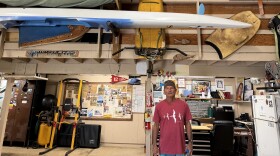The bombshell news of Alaska Airlines' plan to buy Hawaiian Airlines for $1.9 billion is starting to sink in — and customers aren't sure what to think. The sale, which will require federal regulatory approval, could be a year and a half away.
In the meantime, there is some nervousness over what the merger means for loyal Hawaiian customers wary of losing local control. How will the merger work in the short and long term? The Conversation brought in executives from both airlines to learn the latest.
"While it's certainly been a difficult few years, we're not doing this because we think this is the only alternative available to us. We are doing it because we think this is going to make a better, more competitive airline for Hawaiʻi," said Avi Mannis, executive vice president and chief marketing officer at Hawaiian Airlines.
When the merger was announced on Dec. 3, Alaska CEO Ben Minicucci said the two brands would remain the same, coexisting under one company. It's an unusual move in an industry where waves of acquisitions have led to four big brands dominating the U.S. market.
"There's a lot of wait and see to make sure we really do, and, you know, that's fair, and that's appropriate to make sure that we continue to uphold that commitment," said Diana Birkett Rakow, senior vice president for public affairs and sustainability at Alaska Airlines.

Many Hawaiian Airlines customers have expressed concern about their HawaiianMiles and frequent flyer statuses. Until the deal closes, respective miles and statuses will remain unchanged. However, once the transaction closes, the loyalty programs will merge.
"We can't say exactly what that's going to look like right now," Mannis said. "But people should know that their HawaiianMiles that they earned today, whether they're flying with us or using our credit card, will continue to have value that will be carried over into a combined program. Their status that they earn on us will continue to be honored."
Rakow said there has been a lot of excitement from Alaska Airlines customers, especially on the U.S. West Coast, who have a lot of respect for Hawaiian Airlines.
She said both airlines are deeply rooted in the place names that adorn their aircraft: Alaska and Hawaiʻi.
NBC's "Saturday Night Live" had a little fun with the merger this past weekend. In its sketch news segment, "Weekend Update," anchor Colin Jost quipped, "Alaska Airlines has announced plans to buy Hawaiian Airlines for nearly $2 billion. Alaska and Hawaiian combined will be called 'Technically American Airlines.'"
The airline executives said it's not every day that their airlines get mentioned on "Saturday Night Live."
"I think there's a lot of pride that's in both of our airline names being out there in sort of the pop culture lexicon and widespread conversation," Rakow said. "Obviously the one thing they missed is just how proud we are in our independent names and brands and the places that they represent, and the commitment for those to live on."
Both airlines were born from serving air-dependent communities in isolated states. Rakow said Alaska Airlines understands what it takes to serve air-dependent areas, which it has done in Alaska for a long time — serving 19 communities, only three of which are accessible by road.
"So we're really honored to accept the responsibility of continuing to serve neighbor islands the way that Hawaiian has for a long time," she said.
Over the next 12 to 18 months, the airlines will get to know each other and share information about everything from reservation systems to in-flight meals.
"We will be one team behind those two brands. One set of union groups. One team powering the airline, and one single operating certificate. So it'll be, I think, an interesting and exciting journey to figure out how to bring those together," Rakow told The Conversation.
The companies said they are committed to preserving their union jobs. However, Alaska CEO Minicucci said there will be layoffs.
"There's going to be some duplication in roles that we're going to have to address," Minicucci said previously. "I can't tell you what that number is, but I'm hopeful that the number is not large.“
This story aired on <i>The Conversation</i> on Dec. 14, 2023. The Conversation airs weekdays at 11 a.m. on HPR-1. <i>Sophia McCullough</i> adapted this story for the web.





